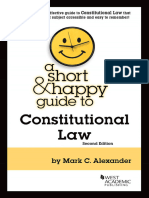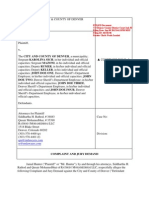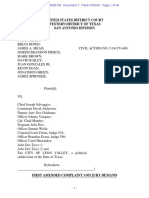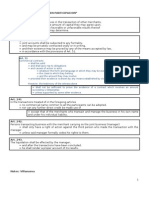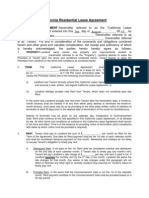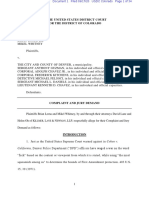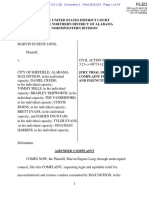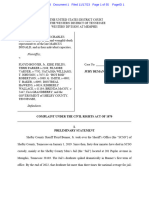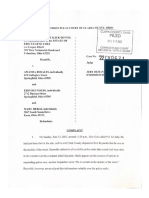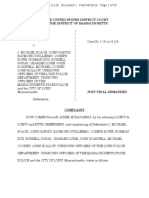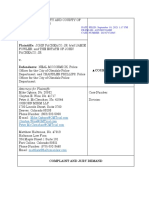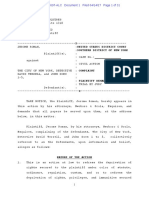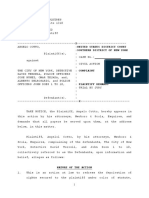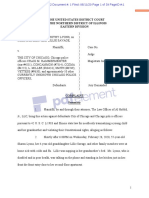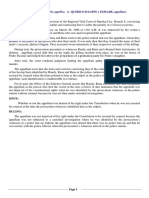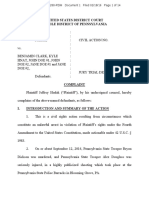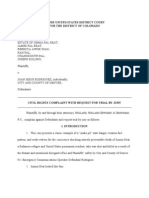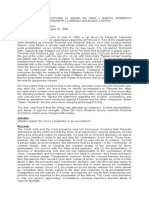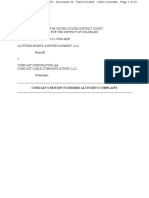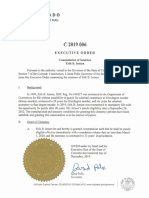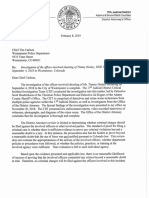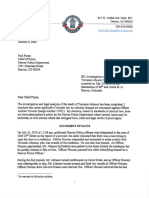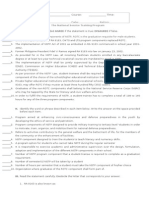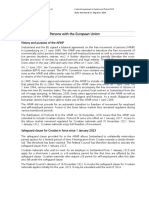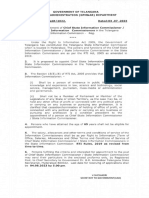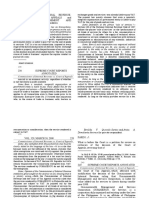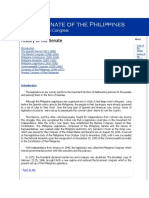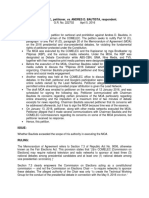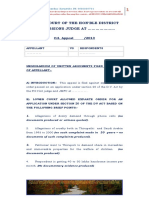Ryan Ronquillo Complaint
Ryan Ronquillo Complaint
Uploaded by
Michael_Lee_RobertsCopyright:
Available Formats
Ryan Ronquillo Complaint
Ryan Ronquillo Complaint
Uploaded by
Michael_Lee_RobertsOriginal Description:
Copyright
Available Formats
Share this document
Did you find this document useful?
Is this content inappropriate?
Copyright:
Available Formats
Ryan Ronquillo Complaint
Ryan Ronquillo Complaint
Uploaded by
Michael_Lee_RobertsCopyright:
Available Formats
Case 1:16-cv-01664 Document 1 Filed 06/28/16 USDC Colorado Page 1 of 39
IN THE UNITED STATES DISTRICT COURT
FOR THE DISTRICT OF COLORADO
Civil Action No. 16-cv-1664
ESTATE OF RYAN RONQUILLO, by and through
APRIL SANCHEZ as personal representative
Plaintiff,
v.
CITY AND COUNTY OF DENVER;
ERNEST SANDOVAL, individually and in his official capacity;
JEFFREY DIMANNA, individually and in his official capacity;
JOEL BELL, individually and in his official capacity;
LUKE INGERSOLL, individually and in his official capacity;
BRIAN MARSHALL, individually and in his official capacity;
DANIEL WHITE, individually and in his official capacity;
TONI TRUJILLO, individually and in her official capacity;
Defendants.
CIVIL RIGHTS COMPLAINT WITH REQUEST FOR TRIAL BY JURY
Plaintiff Estate of Ryan Ronquillo, by and through counsel, HOLLAND, HOLLAND
EDWARDS & GROSSMAN, P.C., complains against Defendants and request a trial by jury as
follows:
I.
1.
INTRODUCTION
Ryan Ronquillo was killed on July 2, 2014, as a result of grossly excessive deadly
force and deliberately indifferent police practices by the City and County of Denver.
Case 1:16-cv-01664 Document 1 Filed 06/28/16 USDC Colorado Page 2 of 39
2.
Just 20 years old at the time, Mr. Ronquillo was unarmed when he was shot to
death by police officers in the parking lot of a funeral home, a funeral he was known by many of
the involved officers to be attending for the death of his close friend.
3.
This killing began with multiple officers assaulting an unarmed and non-violent
Ryan Ronquillo outside the funeral home, after police had been surreptitiously pursuing him for
hours for a mere suspected property crime in connection with a stolen car.
4.
From the moment they came on scene, officers did not clearly identify themselves
as law enforcement or afford Mr. Ronquillo the slightest opportunity to peacefully surrender.
5.
Instead, despite no preceding threat, they assaulted him while he was still in his
vehicle, punching him on his head repeatedly, which left several non-gun shot related facial
injuries found during the autopsy.
6.
Video surveillance, Exhibit A, hand filed with the Courts Clerk, and
incorporated herein by this reference, shows Mr. Ronquillo parking in front of the funeral home,
police quickly closing in, and then immediately assaulting him in his car.
7.
When Mr. Ronquillo attempted to escape this unprovoked assault in self-defense
he made accidental vehicle contact with one of the officers.
8.
Despite the fact that he was unarmed and not posing a deadly threat to either
officers or civilians at the time with force other than potentially his vehicle, four of the
Defendants unified response was to shoot at the moving vehicle, a deadly force practice that was
both grossly excessive and permitted by Denvers deliberately indifferent training and policies at
the time.
Case 1:16-cv-01664 Document 1 Filed 06/28/16 USDC Colorado Page 3 of 39
9.
Four officers fired a total of eleven bullets at Mr. Ronquillo, three of which hit his
head and neck.
10.
Although this shooting was preceded and caused by an unjustified assault on
Ryan Ronquillo by these officers, Denver has since covered up what happened by purposely
falsely stating, including most recently in February 2016 through Denver Police Chief White,
that as the police approached, and before they made any contact with him, Ryan Ronquillo
backed up at a high rate of speed.
II.
11.
JURISDICTION AND VENUE
This action arises under the Constitution and laws of the United States and is
brought pursuant to 42 U.S.C. 1983 and 42 U.S.C. 1988. The Jurisdiction of this Court is
invoked pursuant to 28 U.S.C. 1331, 1343, 2201.
12.
This case is instituted in the United States District Court for the District of
Colorado pursuant to 28 U.S.C. 1391 as the judicial district in which all relevant events and
omissions occurred and in which Defendants maintain offices and/or reside.
III.
13.
PARTIES
At all times relevant hereto, the decedent, Ryan Ronquillo, was a citizen of the
United States and a resident of the State of Colorado.
14.
At all times relevant hereto, April Sanchez, the duly appointed personal
representative of the Plaintiff Estate of Ryan Ronquillo, opened in the City and County of
Denver, was the mother of Ryan Ronquillo and a citizen of the United States and resident of the
State of Colorado.
Case 1:16-cv-01664 Document 1 Filed 06/28/16 USDC Colorado Page 4 of 39
15.
Defendant City and County of Denver (Denver) is a Colorado municipal
corporation and county.
16.
Defendant Denvers Department of Safety is responsible for the oversight,
supervision, and training of the Denver Police Department, headed by Chief Robert White as the
final delegated policy maker for the Denver Police Department and the Denver Sheriffs
Department.
17.
At all times relevant hereto, Defendant Ernest Sandoval, a Denver police officer,
was a citizen of the United States and a resident of Colorado, and was acting under color of state
law in his capacity as a law enforcement officer employed by the Denver Police Department.
18.
At all times relevant hereto, Defendant Jeffrey DiManna was a citizen of the
United States and a resident of Colorado, and was acting under color of state law in his capacity
as a law enforcement officer employed by the Denver Police Department.
19.
At all times relevant hereto, Defendant Joel Bell, a sergeant in the Denver Police
Department Fugitive Unit, was a citizen of the United States and a resident of Colorado and was
acting under color of state law in his capacity as a law enforcement officer employed by the
Denver Police Department.
20.
At all times relevant hereto, Defendant Luke Ingersoll was a citizen of the United
States and a resident of Colorado, and was acting under color of state law in in his capacity as a
deputy sheriff employed by the Jefferson County Colorado Sheriffs Department.
21.
At all times relevant hereto, Defendant Brian Marshall was a citizen of the United
States and a resident of Colorado, and was acting under color of state law in his capacity as a law
enforcement officer employed by the Denver Police Department.
Case 1:16-cv-01664 Document 1 Filed 06/28/16 USDC Colorado Page 5 of 39
22.
At all times relevant hereto, Defendant Daniel White was a citizen of the United
States and a resident of Colorado, and was acting under color of state law in his capacity as a law
enforcement officer employed by the Denver Police Department.
23.
At all times relevant hereto, Defendant Toni Trujillo was a citizen of the United
States and a resident of Colorado, and was acting under color of state law in her capacity as a law
enforcement officer employed by the Denver Police Department.
IV.
24.
STATEMENT OF FACTS
On July 2, 2014, Ryan Ronquillo was attending a funeral for his close friend at
the Romero Funeral Home, located at 4750 Tejon Street in Denver, Colorado.
25.
Mr. Ronquillo had been at the funeral before he was killed, to the observation of
many witnesses, including at least one related to involved Denver law enforcement.
26.
He was shot to death outside the funeral home in the parking lot by Denver police
officers reportedly at about 6 p.m. on July 2, 2014.
27.
Throughout the service, witnesses grieved with Mr. Ronquillo in and outside of
the Funeral Home, as early as 4:15pm, where many saw him mourning the death of his friend.
28.
According to police reports, Safe Streets Fugitive Task Force began tracking Mr.
Ronquillos location by GPS coordinates from his phone at approximately 2:45pm.
29.
Mr. Ronquillo was a non-violent suspect who was being pursued by police
officers and their task forces for arrest warrants relating to property crimes.
30.
At least several of the involved officers, including Defendants Sandoval,
Marshall, DiManna and White, admittedly knew that Mr. Ronquillo was attending a funeral at
the time of his arrest and killing.
Case 1:16-cv-01664 Document 1 Filed 06/28/16 USDC Colorado Page 6 of 39
31.
Before the shooting, this specific funeral was specifically discussed with the
Denver Gang Unit by Detective Adam Lucero, who stated he received multiple calls about it
both from a member of the public and from District 1 Officer Blanc.
32.
Officer Sandoval admitted that he learned over the radio that Ronquillo had
backed his vehicle into a parking spot at a funeral home and they were going to attempt to arrest
him there. (Emphasis supplied.)
33.
Defendant White acknowledged knowing that he learned before these events that
there was a viewing for someone who had killed himself.
34.
Defendant Marshall admitted to Denver Police Captain Saunier that, prior thereto,
he also knew from Detective Lucero that a funeral was taking place for someone who had killed
himself and the viewing was at Romeros Funeral Home.
35.
Defendant DiManna admits that Detective Lucero advised the nightshift gang
unit that a funeral for someone who had committed suicide was taking place at Romeros.
36.
Just before he was killed, Mr. Ronquillo returned to the funeral and pulled into a
parking space in the funeral home parking lot, clearly planning to get out of his car and go back
inside.
37.
Although he was quickly and easily located, officers recklessly decided to
effectuate his arrest at a funeral while he was still in his car.
38.
At the time of his arrest, there were no exigent circumstances and Mr. Ronquillo
posed no threat to anyone.
Case 1:16-cv-01664 Document 1 Filed 06/28/16 USDC Colorado Page 7 of 39
39.
Despite no pressing, let alone exigent, circumstances, the officers chose not to
wait until Mr. Ronquillo was out of car and no longer potentially vehicle mobile in order to
safely apprehend him with the large number of officers present.
40.
This decision was contrary to the preceding arrest plan to land him without
his being in the vehicle he was in driving.
41.
Thus, Defendant Trujillo explained regarding the original arrest plan: The plan
was to arrest Ronquillo in a stationary spot so as not to engage him in a car chase. The plan was
to have undercover Detectives keep an eye on Ronquillo and follow him if necessary, until he
landed at a place where the uniformed officers could safely arrest him.
42.
This plan was unjustifiably and unreasonably abandoned, as Mr. Ronquillo had
not yet completed becoming landed or stationary by turning the engine off.
43.
Despite no exigent circumstances, the officers did not choose anywhere near the
safest course of action or follow proper procedures for a high-risk felony stop.
44.
Instead, these Defendants recklessly chose the most dangerous means of
apprehension possible for all involved, including Mr. Ronquillo, themselves and the public.
45.
After Mr. Ronquillo pulled into a funeral parking lot space between two cars, two
SUVs came dangerously flying in, according to eye-witnesses.
46.
Here is photo of Mr. Ronquillos parked car in the Romero Funeral Home parking
space just before the police wedged him in to the front:
Case 1:16-cv-01664 Document 1 Filed 06/28/16 USDC Colorado Page 8 of 39
47.
There were many witnesses to this assault and killing, as people came out from
the funeral to see what was happening.
48.
According to witness Mallory Morales, the police came in without sirens or
warning, and with no regard for the people and children around, who were in danger of being
almost run. . .over.
49.
Witness Elvira Galvan reported: she saw a big black truck coming at us really
fast and thought we were going to be run over and had to get of the way really fast to avoid it.
50.
This unmarked vehicle was a Ford Expedition driven by DPD Detective
Defendant Ingersoll.
51.
The second of these SUVs was a gray unmarked silver Lexus SUV driven by
Defendant Bell.
52.
Witness Tina Trujillo also stated that she was almost hit by a moving police
vehicle.
53.
Witness Duran stated that these unmarked vehicles almost hit two little girls.
Case 1:16-cv-01664 Document 1 Filed 06/28/16 USDC Colorado Page 9 of 39
54.
Witness Luevano stated one vehicle almost ran her over and she was forced to
jump out of the way.
55.
Officers placed their vehicles in a position to wedge Ronquillo into his parking
space with their cars, before he was able to turn off or exit the car to return to the funeral.
56.
This is a picture of the wedge they created:
57.
In this wedge, Defendant Ingersolls unmarked black Ford Expedition formed the
left part of the wedge visible in the picture, while Defendant Bells unmarked Lexus formed the
right part.
58.
After making bumper contact with Ronquillos parked car, Defendant Ingersoll
exited his vehicle and immediately ran up to the front passenger window.
59.
At the same time, Defendant Bell exited his vehicle and ran up to the front driver
side window of Mr. Ronquillos parked car.
Case 1:16-cv-01664 Document 1 Filed 06/28/16 USDC Colorado Page 10 of 39
60.
Simultaneously, Defendants DiManna and Sandoval arrived on scene in a police
car, having followed immediately behind Defendant Ingersolls unmarked Expedition into the
funeral home parking lot.
61.
Defendant Sandoval exited the passengers side of this vehicle and immediately
ran to the drivers side front window of Mr. Ronquillos parked car.
62.
Here are a couple of stills from Exhibit A video showing some of the officers
running right up to Mr. Ronquillos parked car:
10
Case 1:16-cv-01664 Document 1 Filed 06/28/16 USDC Colorado Page 11 of 39
63.
Defendant DiManna exited the drivers side of the vehicle, ran around the car
parked immediately to the south of Ronquillos car (which was facing east towards the funeral
home) and took a position behind and to the passengers side of Ronquillos car.
64.
Defendant White, who was driving alone following the DiManna/Sandoval
vehicle, likewise ran to the back of Ronquillos parked car, positioning himself to the right rear
side of him in an effort to stay out of the way in case the vehicle moved backwards.
65.
Simultaneously, Defendant Trujillo, driving her own unmarked Ford Fusion,
recklessly parked in the middle of Tejon street (the street immediately behind and to the west of
Ronquillos east-facing parked car), rather than entirely blocking Mr. Ronquillos car from
directly behind.
66.
Defendant Trujillo exited her car and also recklessly approached the rear of
Ronquillos car.
67.
According to a number of witnesses, many of the officers did not clearly identify
themselves as law enforcement and a significant number were not in uniform.
68.
Some witnesses believed they were witnessing a high-speed chase and a fight was
possibly about to happen.
69.
Witnesses including Gomez, Morales, Galvan, Quintana, Jaszczyk, and Gonzales
have variously reported: They didnt call out police; You wouldnt think they were police
officers; I did not hear anyone say they were police and; I didnt hear them yell anything like
that.
70.
Mr. Ronquillo was unaware that he was being followed for hours by police units
from multiple jurisdictions for property crimes.
11
Case 1:16-cv-01664 Document 1 Filed 06/28/16 USDC Colorado Page 12 of 39
71.
After wedging in his car, the officers did not give Mr. Ronquillo any chance to
surrender peacefully.
72.
No officer presented a badge, according to several witnesses, including
Bustamente, Galvan, Gomez, Jaszczyk and Gonazales.
73.
A number of witnesses report they never heard police give any commands or
instructions that would afford Mr. Ronquillo a chance to surrender peacefully.
74.
Witness Gonzales reported that Mr. Ronquillo was never given a chance to
surrender, stating: They didnt say put your hands up, or surrender, or anything like that. It
was crazy.
75.
Defendant Trujillo also admitted that Ronquillo was not given a chance to
surrender, answering No (under oath) when asked if she gave him or heard other officers give
him any commands.
76.
After not giving Mr. Ronquillo a chance to surrender, the officers assaulted him
without the slightest shred of justification, in a flagrantly excessive use of force.
77.
This highly aggressive assault of the unarmed Ryan Ronquillo can be seen in the
attached Exhibit A video, which shows multiple officers attacking him, without affording him
any reasonable opportunity to first peacefully surrender and obey commands to get out of his car
(if, arguendo only, any such were given), where his arrest could have been safely effectuated
without such excessive force.
78.
No officer reports any preceding physical violence or threats by Mr. Ronquillo
that would justify the use of any hands-on physical force.
12
Case 1:16-cv-01664 Document 1 Filed 06/28/16 USDC Colorado Page 13 of 39
79.
He was in fact doing nothing aggressive and not an imminent threat to any other
80.
At the time law enforcement decided to assault Mr. Ronquillo, he was not actively
person.
resisting arrest or attempting to evade arrest by flight.
81.
At the time he was assaulted and killed, Ronquillo was unarmed.
82.
Denver Police Department Commander Matt Murray admitted in the media that
there was no evidence that Mr. Ronquillo was armed or violent at the time he was attacked.
83.
Law enforcement also had no reasonable expectation that Mr. Ronquillo was
about to become an imminent threat to anyone.
84.
Rather, at least some of these Defendants and their police colleagues, had every
reason to expect that having just parked, Mr. Ronquillo intended to voluntarily get out his car to
return to the funeral for his friend, which would have allowed his safe arrest outside without any
potential danger from a moving vehicle.
85.
The Exhibit A video shows multiple officers running up to the passenger and
driver windows and a flurry of activity.
86.
According to his sworn statement, Defendant Sandoval admitted that he pounded
Ronquillo in the face repeatedly through his car window.
87.
Specifically, Defendant Sandoval reported that, he ran up to the drivers side of
Mr. Ronquillos vehicle, ripped the suspects shirt collar area, and pulled some type of
Broncos key lanyard from around Ronquillos neck.
13
Case 1:16-cv-01664 Document 1 Filed 06/28/16 USDC Colorado Page 14 of 39
88.
According to a police summary, Defendant Sandoval punched [Mr. Ronquillo]
several times in the head, and reported that these multiple punching actions had no effect.
(Emphasis supplied.)
89.
In his own videoed words, Defendant Sandoval says: I struck him a couple times
in the face. . . it didnt work at all.
90.
From these assaults, in addition to bullet holes, the Coroner found multiple non
gun shot related injuries and abrasions on and about Mr. Ronquillos head and face.
91.
One of these punches caused a laceration to his mouth:
92.
Defendant Sandoval was assisted in carrying out this concerted unprovoked brutal
assault by multiple officers, including but not limited to Defendants Bell and Ingersoll, who were
all aggressively hitting him, grabbing at Mr. Ronquillo, or smashing his car windows with
various weapons, and trying to forcibly remove him from his car.
14
Case 1:16-cv-01664 Document 1 Filed 06/28/16 USDC Colorado Page 15 of 39
93.
Defendant Sandoval further reported that another officer, later established as
Defendant Ingersoll, broke out the passenger side window of Ronquillos car.
94.
Defendant Ingersoll also grabbed Ryan Ronquillos hand and/or arm before he
drove the car backward.
95.
Defendant Ingersoll also admits that he attempted to break or did break out the car
windows.
96.
Defendant Daniel White conceded that the officers were trying to break out
Ronquillos window and were trying to grab him from the vehicle.
97.
Defendant Trujillo, the first shooter, has stated that she observed officers trying to
break out the window of the black Honda.
98.
Defendant Trujillo was present during this assault by her fellow officers and along
with all the officers present, including several named Defendants, did nothing to intervene to
stop it, despite opportunity.
99.
Multiple non-police eye witnesses also report that the attacking officers were
hitting Ryan Ronquillo, kicking at him, and attempting to break out the car windows using their
weapons, including batons, flashlights, gun butts, and clubs.
100.
Witnesses Morales saw an officer, believed to be Defendant Sandoval based on
his herein quoted admissions, hitting Ryan with his fists repeatedly.
101.
According to witness Morales, Mr. Ronquillo was trying to move towards the
passenger side during this assault.
102.
Witnesses Bustamente, Morales and Jaszcyk state that one officer even reached
his leg through the window and appeared to be trying to kick Ronquillos face.
15
Case 1:16-cv-01664 Document 1 Filed 06/28/16 USDC Colorado Page 16 of 39
103.
No clear commands were given during this group assault.
104.
Further, even if any such orders were given during this assault, which they were
not, Mr. Ronquillo was not given any reasonable or sufficient opportunity to comply, as several
officers were simultaneously physically assaulting him, which prevented the possibility of such
compliance.
105.
Mr. Ronquillo foreseeably tried to exercise his right of self-defense to escape this
grossly excessive and illegal assault by law enforcement.
106.
At the time they began the assault, officers knew Mr. Ronquillo could not drive
forward because they made bumper contact with his car when they wedged him in, as admitted
by law enforcement and shown in the photos and video footage.
107.
However, as part of their reckless decision to assault him, the officers also
recklessly did not plan to completely block the backwards path of Ronquillos vehicle, despite
having the opportunity and physical means to do so, using Defendant Trujillos Ford Fusion
vehicle that arrived on scene at the same time the officers wedged the car to block his forward
path.
108.
Mr. Ronquillo foreseeably backed up his vehicle in an effort to escape, unaware
that Defendant Trujillo was approaching his car from behind as officers were assaulting him.
109.
While backing up the vehicle, Ronquillo made accidental injurious physical
contact with the recklessly positioned Defendant Trujillo.
110.
Continuing backwards, Mr. Ronquillos car also made contact with Defendant
Trujillos vehiclestill parked and now unoccupied in the middle of Tejon Street.
16
Case 1:16-cv-01664 Document 1 Filed 06/28/16 USDC Colorado Page 17 of 39
111.
Several of the Defendants moved to surround Mr. Ronquillos car from the sides
and the rear, his forward path still clearly blocked by the vehicle wedge.
112.
Defendant Marshall, who had arrived at the scene moments after the other
officers, first took up a position in front of Mr. Ronquillos car immediately after it had backed
up into Defendant Trujillos car.
113.
Defendant Marshall apparently recognized the recklessness of his own
positioning, and, before shooting at Mr. Ronquillo, retreated to a more protected position five to
ten feet away from the front drivers side bumper of Mr. Ronquillos car.
114.
As Mr. Ronquillos car moved backwards, Defendant DiManna also retreated to a
position on the passenger side of Mr. Ronquillos car, opposite of Defendant Marshall such that
Defendant Marshall was allegedly worried that he and DiManna were in each others line of fire,
but not in danger from the vehicle.
115.
Defendant White also backed up to a safe position on the passenger side of Mr.
Ronquillos car.
116.
Collectively, the officers had Mr. Ronquillos car completely surrounded: the
Ingersoll/Bell car wedge and other parked cars blocked Mr. Ronquillos forward path; Defendant
Trujillo, with weapon drawn, was behind Mr. Ronquillos car; Defendant Marshall, weapon
drawn, was on the front drivers side of Mr. Ronquillos car, and; Defendants DiManna and
White, weapons drawn, were on the passenger side.
117.
As Defendant Marshall described to investigators the moments before the
shooting started: We had essentially we had an officer perimeter around the suspect car and
17
Case 1:16-cv-01664 Document 1 Filed 06/28/16 USDC Colorado Page 18 of 39
tactically not the best, but the way it was such a dynamic situation, thats what occurred and we
had to work with it.
118.
At or around the time that Mr. Ronquillo put, or was putting his car in gear to
move forward, the Defendant officers opened fire.
119.
Defendant Trujillo fired first, followed by Defendants DiManna, Marshall, and
120.
Several of the shooting officers appear to have recklessly engaged in contagious
White.
or contagion shootings, without independent assessments justifying the need for deadly force,
pursuant to Denvers deliberately indifferent policies governing shooting at moving vehicles.
121.
Defendants Trujillo, DiManna, Marshall, and White fired at least eleven rounds.
122.
According to the Denver Coroner: Ryan Ronquillo, a 20-year-old male, died as a
result of gunshot wounds of the head and neck. The manner of death is homicide.
123.
More particularly, the three bullets to the head and neck were all fatal.
124.
According to the Police Departments ballistic analysis, Defendant Marshall fired
all three of these bullets.
125.
Thus, while all four of these police shooters were actively attempting to kill
Ronquillo, DPD Detective Bisgard reviewed the ballistics report by DPDs forensic scientist,
Zachary Kotas, and concluded that the three fatal bullets recovered from Ryan Ronquillos head
were fired by Officer Marshalls .45 caliber weapon.
126.
In any case, these four shooting officers all knew that their multiple rounds of
bullets aimed at the head and neck and body were virtually certain to cause the death of Mr.
Ronquillo.
18
Case 1:16-cv-01664 Document 1 Filed 06/28/16 USDC Colorado Page 19 of 39
127.
It was constitutionally unreasonable for these defendants to use deadly force
under the totality of the circumstances.
128.
At the time he was shot and killed, Mr. Ronquillo did not pose an actual and
imminent threat to the lives of any officers or civilians present at the scene.
129.
In backing up, Mr. Ronquillo was not targeting the car at any officer, but rather
was positioning his vehicle in the natural direction of the road to escape the continuing assault.
130.
When he pulled forward, Defendant Trujillo was not directly in front of his
vehicle, but was located ahead of the vehicle to the right of the passenger side.
131.
Defendant Trujillo and/or other officers recklessly did not get themselves out of
the way of the vehicle to avoid any danger of being contacted by the vehicle, despite reasonable
opportunities to do so.
132.
Further, it appears that Defendant Trujillo was moving toward the car with her
gun drawn in the moments before she first shot.
133.
These officers also had no reason to believe that just letting Mr. Ronquillo drive
away would pose a threat of serious physical harm to the officers or others, if it were even
possible given the position of surrounding cars and the wedge.
134.
Prior to his fatal attempted arrest, Mr. Ronquillo never displayed any violence nor
did he display any tendency to drive dangerously throughout the day.
135.
In fact, by their own accounts, officers were peacefully following him for hours.
136.
They abandoned professional judgment and impulsively tired of their efforts to
land him, determining instead to just launch an unconstitutional physical assault.
19
Case 1:16-cv-01664 Document 1 Filed 06/28/16 USDC Colorado Page 20 of 39
137.
Prior to any perceived threat by Mr. Ronquillos vehicle, the officers own reckless
conduct in carrying out his arrest created any need to use such deadly force.
138.
Evidencing deliberate indifference in training and supervision in a recurring
situation, the covert operation and planned arrest of Mr. Ronquillo was carried out without any
operational plan or any mandatory approvals for such a plan by DPD commanders under City
policies governing covert operations.
139.
Defendant Bell, who has a history of excessive force complaints, describes
himself as the one in charge of this covert activity.
140.
This covert operation, directed by Defendant Bell and/or by Defendant Ingersoll
and/or Sergeant Gavito, was carried out recklessly by tactical squads at a funeral home,
endangering many innocent bystanders in blatant violation of DPD policies, which mandate that
the safety of the general public, and suspects(s) is of paramount importance when carrying out
covert operations.
141.
Denvers Independent Monitor, Nick Mitchell, found that Ronquillos
apprehension in a parking lot full of people violated such DPD Department policies.
142.
Prior to assaulting and then killing Mr. Ronquillo for mere property crimes, these
Defendants all recklessly decided not to follow any high-risk felony stop procedures.
143.
They did not use a bullhorn or any other similar means to announce that they were
police and he was under arrest.
144.
They did not give Mr. Ronquillo any reasonable or sufficient chance to peacefully
surrender.
20
Case 1:16-cv-01664 Document 1 Filed 06/28/16 USDC Colorado Page 21 of 39
145.
They did not surround Mr. Ronquillo, with guns drawn, from safe and covered
positions, and order him to get out of his car from a distance.
146.
They recklessly did not block all potential escape routes behind his parked vehicle
while taking up safe defensive positions, despite having overwhelming manpower, opportunity
and capacity to do so.
147.
Instead, the officers commenced this process by unconstitutionally attacking Mr.
Ronquillo and thereby intentionally and recklessly decided, contrary to his constitutional right to
be free from unreasonable seizures, not to afford him any reasonable opportunity to surrender or
comply with any such orders.
148.
Police are afforded no constitutional justification for killing someone who is
justifiably defending himself by attempting to get away from an illegal violent assault by police
sworn to uphold the law.
149.
No policeman ever contacted Ryan Ronquillos parents to tell them their son was
dead; they first learned about it from news media accounts.
Denvers Cover-up And Ratification Of This Wrongful Killing
150.
The City of Denver ratified, covered up, and condoned the killing of Ryan
Ronquillo.
151.
On February 16, 2016, Chief White announced that the Denver Police Department
had determined that the four police officers used appropriate force and tactics consistent with
department policies when they shot and killed Ryan Ronquillo in a crowded funeral home
parking lot in July 2014.
21
Case 1:16-cv-01664 Document 1 Filed 06/28/16 USDC Colorado Page 22 of 39
152.
Chief White even stated that the officers made: the best strategic decision
possible on where to stop Ronquillo, and, all the decisions the officers made given what they
were confronted with and given what they knew at the time were reasonable at the time they
made those decisions.
153.
In an August 8, 2014 report, Denvers District attorney also determined that the
killing of Ryan Ronquillo was a reasonable shooting, as essentially always occurs when his
office is asked to investigate a Denver Police Department officer-involved shooting.
154.
In so doing, the District Attorney and Denver Police Chief White both
consciously chose to cover up the actual assault of Mr. Ronquillo that occurred right before he
was killed.
155.
Thus, neither the Chief of Police nor the District Attorney makes any mention of
Defendant Sandovals admissions that he repeatedly punched Ryan Ronquillo in the head before
he began backing up.
156.
DA Morrisey falsely stated in his report that the Defendant officers gave Ryan
Ronquillo repeated commands to stop and repeated opportunities to surrender despite the
sworn statement of Officer Trujillo and other eyewitnesses stating otherwise.
157.
Chief White further falsely reported in February 2016, both in a press release and
in a letter to April Sanchez, that this killing was justified because Ryan Ronquillo tried to flee as
soon as police approached, writing in his own words that: As uniformed officers approached,
Mr. Ronquillo stepped on the gas and advanced in reverse at a high rate of speed. (Emphases
supplied.)
22
Case 1:16-cv-01664 Document 1 Filed 06/28/16 USDC Colorado Page 23 of 39
158.
According to a DPD summary of Defendant Sandovals statements, however, it
was only after Sandoval punched Ronquillo several times that the Honda then backed up
for the first time and Officer Sandoval let go. (Emphases supplied.)
159.
Chief White thus knew of Defendant Sandovals contradicting account at the time
he made the false statements regarding the events prior to the shooting.
160.
DA Morrisey likewise made no mention of these punching admissions by
Defendant Sandoval in his blessing of this police killing resulting in no criminal charges.
161.
Thus, despite video footage and officer reports, to divert from Defendants
liability, Denver has persisted in its cover up, designed to cause the public to falsely perceive that
Ryan Ronquillo took off as the officers approached him, ignored officer commands to surrender,
and fled in his vehicle hitting an officer in his path, rather than backing his car up after suffering
the violent assault admitted to by the officers themselves as described herein.
162.
Though all of this was unquestionably known to Chief White, acting as final
decision maker for Denver, he also has refused to recant this intentionally misleading public
statement, thereby actively continuing this ongoing cover-up to the present time.
163.
Further, in an effort to defuse public criticism of its egregious handling of Mr.
Ronquillos arrest and his unjustified killing, the City has even tried to make it appear that the
police did not understand that Ryan Ronquillo was attending a funeral.
164.
Yet as aforealleged, several of these Defendants knew they were acting right
outside a funeral home where a funeral was occurring.
23
Case 1:16-cv-01664 Document 1 Filed 06/28/16 USDC Colorado Page 24 of 39
165.
As referenced above, Defendant Sandoval stated during his interview with
investigators that a message was aired over the dispatch radio that he knew this was happening at
a funeral home.
166.
As also referenced above, Defendant Marshall, one of the shooters, told
investigators from the District Attorneys office in a sworn statement: Plus I knew from roll call
there was a funeral going on here as well.
167.
At least one officer, anticipating the forthcoming arrest, was reportedly concerned
that there was going to be violence at the funeral home that could threaten his own family
members.
168.
This officer, whose full name is currently unknown, was described in a police
videotaped statement by witness Chris Gomez as: really built, [with] blond hair [and] sleeved
tattoos.
169.
More particularly, at approximately 5 p.m., roughly an hour before the shooting,
Christopher Gomez told Detective Bisgard that an Officer married to Debbie Luevano told:
Debbie and her father, Tony, to leave the funeral home because something was about to go
down. This happened at approximately 5:00 p.m., and they only stayed for approximately 10
minutes.
170.
According to this Mr. Gomezs witness statement: that officer knew what was
going to happen so he warned them.
171.
Mr. Gomez also reported in this statement that he believed the Officer sent his
wife in there to make sure Ryan Ronquillo was inside.
24
Case 1:16-cv-01664 Document 1 Filed 06/28/16 USDC Colorado Page 25 of 39
172.
Mr. Gomez added that the Officer told him he was sorry for his loss and then
reiterated that, he told his wife to get out of there because something like that would happen.
173.
It thus appears that this event may well have actually been planned to occur at the
funeral home.
Facts Relating to Entity Liability
174.
At all times relevant hereto, Denver had deliberately indifferent policies, customs,
habits, training and procedures which permitted police to shoot at persons in or driving moving
vehicles even where, as here, no other deadly force was being used against the officers or
persons present.
175.
Denvers Office of Independent Monitor recently prepared the following partial
timeline of DPD shootings into moving vehicles:
25
Case 1:16-cv-01664 Document 1 Filed 06/28/16 USDC Colorado Page 26 of 39
176.
Defendant Jeffrey DiManna was personally involved in three moving vehicle
related shooting cases in six months, including this case.
177.
At all times relevant hereto, despite a long and continuing history of such
shootings, Denver maintained deliberately indifferent policies, practices, training and procedures
that were seriously outdated and not in conformity with international police practice.
178.
As early as 2006, the International Association of Chiefs of Police (IACP) Model
Policy relating to shooting at moving vehicles stated:
Firearms shall not be discharged at a moving vehicle unless a person in the
vehicle is immediately threatening the officer or another person with deadly force
by means other than the vehicle. The moving vehicle itself shall not
presumptively constitute a threat that justifies an officers use of deadly force. An
officer threatened by an oncoming vehicle shall move out of its path instead of
discharging a firearm at it or any of its occupants.
179.
At all times relevant hereto, with deliberate indifference, Denver policies and
procedures allowed guns to be fired at moving or fleeing vehicles when no deadly force was
being used against the police or other persons present by means other than the force of a moving
vehicle, contrary to well-established accepted police practices.
180.
At all times relevant hereto, with deliberate indifference, Denver policies did not
require police officers to exercise good judgment and not move into or remain in the path of
moving cars, nor require that they attempt to move to a position of safety rather than shooting at
the vehicle or its occupants.
181.
After these events, as part of Denvers longstanding pattern, habit and custom of
tolerating, permitting, ratifying, encouraging and permitting officers to shoot at moving vehicles
even when no deadly force is being used against the police officer or another person present by
means other than the moving vehicle, Denver police officers Greene and Jordan killed Jessica
26
Case 1:16-cv-01664 Document 1 Filed 06/28/16 USDC Colorado Page 27 of 39
Hernandez, an unarmed teenager, allegedly in possession of a stolen car, by firing into her
vehicle.
182.
It was not until June 2015, after this unconstitutional killing and others, that
Denver Police Department updated its deliberately indifferent policies with respect to
discharging firearms at moving vehicles.
183.
DPDs Operations Manual now states: Firearms shall not be discharged at a
moving or fleeing vehicle unless deadly force is being used against the police officer or another
person present by means other than the moving vehicle. OMS 105.05(5)(a).
184.
As the obvious alternative, it provides: Officers shall exercise good judgment
and not move into or remain in the path of a moving vehicle or any occupant. An officer in the
path of a vehicle shall attempt to move to a position of safety rather than discharging a firearm at
the vehicle or any of the occupants. OMS 105.05(5)(b).
185.
Before June 2015, Denver maintained deliberately indifferent policies and
training with respect to police officers shooting at moving vehicles and killing people, and
instead unconstitutionally turned a blind eye to this obviously recurring problem resulting in
additional similar fatal police shootings after this one.
186.
The acts and omissions of these individual Defendants were also engaged in
pursuant to the custom, policy, training and practice of the City and County of Denver and the
Denver Department of Safety, which has frequently encouraged, condoned, tolerated, and
ratified the use of excessive force by law enforcement officers in this City resulting in a veritable
litany of death and severe physical injuries to the public.
27
Case 1:16-cv-01664 Document 1 Filed 06/28/16 USDC Colorado Page 28 of 39
187.
The Denver Department of Safety consists of both the Denver Police Department
and the Denver Sheriffs Office. Law enforcement officials from both branches of the
Department of Safety have repeatedly and unlawfully used excessive force against citizens.
188.
Denver law enforcement officers have engaged in a persistent practice of law
enforcement misconduct, and the officials responsible for assuring that such misconduct does not
occur have consistently failed to properly train, supervise, and discipline individual officers who
have engaged in such misconduct.
189.
This culture and environment of brutality and the lack of training, supervision,
and discipline of law enforcement officers is evidenced by, among other things, the sheer volume
of lawsuits filed against and/or legal settlements with Denver law enforcement alleging excessive
force, the involvement of dozens of different law enforcement officials in those lawsuits, and the
repeated involvement of the same officers in multiple lawsuits.
190.
For example, Denver City Attorney David Fine reported to the Denver City
Council in September of 2010 that the city of Denver has spent nearly $6.2 million since 2004 to
settle lawsuits involving police officers, and nearly all of the payouts were for allegations of
excessive force. These statistics do not even include lawsuits against the City and County of
Denver arising out of Sheriffs Department conduct.
191.
This figure has gone much higher since the payment of the six million dollar
Marvin Booker judgment for his homicide in the Denver jail at the hands of multiple individual
deputy sheriffs, and the payment of 3.25 million dollars to Jamal Hunter who was tortured,
attacked and had his genitals scalded when hot water was thrown on his groin.
28
Case 1:16-cv-01664 Document 1 Filed 06/28/16 USDC Colorado Page 29 of 39
192.
Arising out of an incident on January 11, 2011, Denver settled an excessive force
lawsuit with Alexander Landau for $795,000, who was beaten with the officers fists, radio, and
a flashlight in a brutal racially motivated assault.
193.
Arising out of an incident in July 2009, the City paid $360,000 to Ana Ortega and
three other women who were assaulted with mace and hands-on excessive force outside of the
Denver Diner. Officers who were repeat players in these excessive force incidents were allowed
to continue working at the Denver police department.
194.
Earlier than these recent cases, and the shooting death of Jessica Hernandez
similar to the facts here, between January and June of 2010, seventeen Denver police officers
were associated with excessive force complaints, a higher ratio per law enforcement officer than
any other U.S. City.1
195.
In 2008, the City of Denver and Denver Health paid a combined $7 million to the
family of Emily Rae Rice, who had died while in custody of the Denver Sheriffs Department
due to the deliberately indifferent conduct by Defendants.
196.
Also in 2008, Denver paid $150,000 to Timothy Thomason, who was deprived of
medical care while in the city jail.2
197.
Denver has a long history of tolerating and ratifying this custom of excessive
force practiced in law enforcement, which includes, without limitation, the cases discussed
herein and the following additional cases as samples:
Joel Warner, Police Misconduct: Denver ranks number one in terms of excessive force complaints, Westword,
Sept. 10, 2010, available at:
http://blogs.westword.com/latestword/2010/09/police_misconduct_denver_ranks_number_one_in_terms_of_excessi
ve_force_complaints.php.
2
Michael Roberts, The City Council pays out to Timothy Thomason, WESTWORD, Aug. 19, 2008, available at
http://blogs.westword.com/latestword/2008/08/the_city_council_pays_out_to_t.php.
29
Case 1:16-cv-01664 Document 1 Filed 06/28/16 USDC Colorado Page 30 of 39
a. Arising from conduct in 2004, Denver paid the family of Paul Child $1.32
million to settle a lawsuit brought after Mr. Childs, a developmentally
disabled 15 year-old boy, was fatally shot by Denver Police Officer James
Turney.
b. Arising from conduct on February 25, 2004, Denver was sued relating to the
death of Gregory Lee Smith, Jr., who was shot by Denver Police
c. Arising from conduct on July 1, 2005, when Jeffrey R. Mayton alleged that
Denver Police used excessive force against him in retaliation for his voicing
medical needs after he was already arrested, causing significant injuries.
d. Arising from conduct on August 5, 2005, when Quincy Michael Shannon
alleged that Denver Police assaulted him with mace or pepper spray and other
excessive force for no justifiable reason.
e. Arising from conduct on November 21, 2005, when David Nettles alleged that
Denver Police effectuated an unlawful arrest during which they used
excessive force in that they punched him in the ribs, used nun chucks on his
ankles, kicked him in the head and back and caused severe shoulder injury
without justification.
f. Arising from conduct on January 6, 2006, the estate of Frank Lobato alleged
that Denver Police shot and killed Mr. Lobato who was sleeping in his bed
and had done nothing to justify any force at all.
g. Arising from conduct on April 3, 2006, Hirut Berhanmeskel alleged that
Denver Police violently grabbed and twisted her arm behind her back,
slammed her into the wall and broke her wrist without justification while she
was trying to resolve a parking ticket dispute.
h. Arising from conduct on August 11, 2006, Chandler Lyles alleged that Denver
Police tackled and arrested him for no reason, breaking his clavicle.
i. Arising from conduct on June 12, 2007, Ross Edwards Smith alleged that
Denver Police punched him in the face, knocked him to the ground and beat
him for no reason while he was peaceably protesting the Iraq war.
j. Arising from conduct on June 27, 2007, Grace Arlene Mosley alleged that
Denver Police unlawfully arrested her with excessive force causing pain.
k. Arising from conduct in 2008, Denver paid $885,000 to settle a lawsuit
brought in response to an incident in which Denver Police Officers used
excessive force against Juan Vasquez, a 16 year-old boy. Mr. Vasquez was
30
Case 1:16-cv-01664 Document 1 Filed 06/28/16 USDC Colorado Page 31 of 39
severely injured with a lacerated liver and broken ribs after one of the officers
used a fence as leverage to jump up and down on the boys back while he lay
prone on the pavement.3
l. Arising from conduct in January 2009, Denver paid $100,000 to Trudy Trout
to settle a lawsuit that arose out of Denver Police Officer use of excessive
force after she alleged that Denver Police pushed her to the ground, breaking
her wrist and lied about the mechanism of the injury.
m. Arising from conduct on May 15, 2009, Altagracia Medina Valencia alleged
that Denver Police tased her husband to cause him to drop a knife, but then
shot and killed him in front of his family after he had dropped the weapon and
without justification.
n. Arising from conduct on October 16, 2009, Wayne C. Rose alleged that
Denver Police knocked him to the ground while he was fleeing police,
unarmed, and ran over him with a motorcycle, handcuffed him while
unconscious and beat and kicked him repeatedly while unconscious.
o. Arising from conduct on June 30, 2009, Denver settled a lawsuit related to the
excessive force used on Michael DeHerrera. Although Officers Sparks and
Murr were briefly terminated by the Manager of Safety based upon their
excessive force and falsification of official reports, Denver decided to
reinstate both of them to employment.
p. Arising from conduct on June 30, 2009, Shawn Kyeone Johnson alleged that
Denver Police joined in with a bouncer at a club and beat him without any
justification.
q. Arising from conduct on August 10, 2009, Danvis Smith alleged that Denver
Police pulled him from his car, striking him and causing significant injuries to
his arm, shoulder and back, without justification.
r. In September 2009, Denver settled a wrongful death lawsuit for $225,000 to
the family of Alberto Romero, who died after being repeatedly tasered and
beaten with impact weapons by police when he was arrested wearing only
boxer shorts. Before he died, Mr. Romero suffered eight broken ribs and had
his tongue split open from the use of excessive force.
David Packman, Is There a Police Brutality Problem in Denver?, INJUSTICE EVERYWHERE: THE NATIONAL POLICE
MISCONDUCT STATISTICS AND REPORTING PROJECT, Sept. 6, 2010, http://www.injusticeeverywhere.com/?p=3028.
31
Case 1:16-cv-01664 Document 1 Filed 06/28/16 USDC Colorado Page 32 of 39
s. In June 2010, Tyler Mustard filed a lawsuit alleging that Denver Police chased
him, tackled him and beat him in the head, neck and body.
t. In August 2010, Denver paid Chad Forte $22,500 to settle a lawsuit resulting
from excessive force after he alleged that Denver Police jumped him causing
injuries for jaywalking.
198.
Denver is aware of these and many other allegations of excessive force and,
indeed, often has ultimately settled such cases for damages caused by such excessive force.
These cases provide only representative examples of the rampant use of excessive force by
Denver law enforcement officers and the lack of any training or supervision on the part of the
City and County of Denver to prevent this dangerous and unconstitutional conduct.
V.
CLAIMS FOR RELIEF
FIRST CLAIM FOR RELIEF
42 U.S.C. 1983 Excessive Force in violation of the Fourth Amendment
(Plaintiff against all Individual Defendants)
199.
Plaintiff hereby incorporates all of the forgoing paragraphs of this Complaint as if
fully set forth herein.
200.
42 U.S.C. 1983 provides that:
Every person, who under color of any statute, ordinance, regulation, custom or
usage of any state or territory or the District of Columbia subjects or causes to be
subjected any citizen of the United States or other person within the jurisdiction
thereof to the deprivation of any rights, privileges or immunities secured by the
constitution and law shall be liable to the party injured in an action at law, suit in
equity, or other appropriate proceeding for redress . . .
201.
Plaintiff is a citizen of the United States and the individual police officer
Defendants to this claim are persons for purposes of 42 U.S.C. 1983.
202.
All individual law enforcement officer Defendants, at all times relevant hereto,
were acting under the color of state law in their capacities as Denver law enforcement officers.
32
Case 1:16-cv-01664 Document 1 Filed 06/28/16 USDC Colorado Page 33 of 39
203.
At the time of the complained of events, Ryan Ronquillo had a clearly established
constitutional right under the Fourth Amendment to be secure in his person from unreasonable
seizure through excessive force, including excessive deadly force.
204.
At the time of the complained of events, it was clearly established that law
enforcement can not use deadly force against a fleeing suspect in a moving vehicle that does not
pose an actual and imminent threat to the lives of any officers or civilians.
205.
Any reasonable police officer knew or should have known of these rights at the
time of the complained of conduct as they were clearly established at that time.
206.
Under the totality of the circumstances, individual Defendants actions were
objectively unreasonable in light of the facts and circumstances confronting and/or known to
them, violating the Fourth Amendment rights of Ryan Ronquillo to be free from excessive force.
207.
It was not objectively reasonable to assault Ryan Ronquillo, who was unarmed,
suspected only of property crimes, was not attempting to evade arrest before or at the time of his
unprovoked violent assault, and was in no way then posing any immediate or exigent threat to
the physical safety of the officer or others as he was returning to the funeral for his friend.
208.
Under the totality of the circumstances, individual Defendants also unreasonably
used deadly force against Mr. Ronquillo, resulting in his death.
209.
Mr. Ronquillo did not pose an actual and imminent threat to the lives of any
officers or civilians present at the scene when they fired their fatal shots.
210.
These officers had no reason to believe that letting Mr. Ronquillo drive away at
that time would pose a threat of serious physical harm to the officers of others.
33
Case 1:16-cv-01664 Document 1 Filed 06/28/16 USDC Colorado Page 34 of 39
211.
These officers knew that the multiple rounds of bullets fired to Ryan Ronquillos
head and neck were certain to cause his death.
212.
Further, within the meaning of clearly established law, the Defendants hereto all
individually and jointly created any such need for deadly force in this incident through their
own reckless, deliberate conduct that was immediately connected to the firing officers use of
excessive deadly force. See Pauly v. White, 814 F.3d 1060 (10th Cir. 2016).
213.
The Defendant officers conduct prior to the suspects threat of force must be
considered because, that conduct is `immediately connected to any suspects threat of
force. See Allen v. Muskogee, 119 F.3d 837, 840 (10th Cir. 1997).
214.
This is because it is plain that reasonableness depends on not only when a
seizure is made, but also how it is carried out. Tennessee v. Garner, 471 U.S. 1, 7-8 (1985).
215.
Evidencing deliberate indifference in training and supervision in a recurring
situation, multiple police officers carried out this arrest recklessly and with grossly excessive
force, by inter alia, consciously deciding to effectuate this arrest of Ryan Ronquillo while he was
still in his car outside a funeral home despite no exigent circumstances, not clearly identifying
themselves as law enforcement, not giving Ryan Ronquillo any chance to peacefully surrender,
violently assaulting him in his car, and positioning themselves recklessly around the vehicle
while assaulting him, all contrary to well-established felony stop policies and practices.
216.
At the time this unarmed 20-year-old was shot at some 11 times by Defendants
Trujillo, White, Marshall, and DiManna, Ryan Ronquillo was reasonably exercising his clearly
established right to self-defense by attempting to get away from his violent attacking assailants to
preserve his life.
34
Case 1:16-cv-01664 Document 1 Filed 06/28/16 USDC Colorado Page 35 of 39
217.
The pre-shooting and the shooting actions of all of these officers may be fairly
attributed to each of these jointly acting Defendants conduct, none of whom did anything to
intervene to even attempt to prevent these events or assist thereafter, despite duty and
opportunity.
218.
The complained of acts or omissions of individual Defendants were proximate
causes of Mr. Ronquillos death.
219.
The acts of omissions of these Defendants caused Mr. Ronquillo damages in that
he suffered extreme physical and mental pain during the assault that resulted in his death.
220.
The acts or omissions of Defendants as described herein deprived Plaintiff of his
constitutional rights and caused him other damages.
221.
As a proximate result of Defendants unlawful conduct, Ryan Ronquillos Estate
has suffered actual physical and emotional injuries, and other damages and losses entitling him
to compensatory damages in amounts to be determined at trial. These injuries include, but are not
limited to, loss of constitutional and federal rights, physical injuries, extraordinary pain and
suffering at the time of death, emotional distress and hedonic damages to which his Estate is
entitled to claim on his behalf, and for his loss of enjoyment of life and the value of his life and
continuing familial relationships.
222.
Plaintiff Estate also has suffered lost future earnings, earnings capacity and
related economic loss from Ryan Ronquillos life being cut short at the age of 20.
223.
Plaintiff is further entitled to attorneys fees and costs pursuant to 42 U.S.C.
1988, pre-judgment interest and costs as allowable by federal law.
35
Case 1:16-cv-01664 Document 1 Filed 06/28/16 USDC Colorado Page 36 of 39
224.
In addition to compensatory, economic, consequential and special damages,
Plaintiff is entitled to punitive damages against each of these individual Defendants, as their
actions were taken maliciously, willfully and with a reckless or wanton disregard of the
constitutional rights of Plaintiff.
225.
Because of their willful participation and actions in concert in this joint activity,
each of these Defendants are liable to Plaintiff for all the proximately resulting injuries and
damages complained of herein.
SECOND CLAIM FOR RELIEF
Violation of 42 U.S.C. 1983 Deliberately Indifferent Policies, Practices, Customs,
Training, Supervision and Ratification in violation of the Fourth Amendment
(Against City and County of Denver only)
226.
Plaintiff hereby incorporates all the forgoing paragraphs of this Complaint as if
fully set forth herein.
227.
42 U.S.C. 1983 provides that:
Every person, who under color of any statute, ordinance, regulation, custom or
usage of any state or territory or the District of Columbia subjects or causes to be
subjected any citizen of the United States or other person within the jurisdiction
thereof to the deprivation of any rights, privileges or immunities secured by the
constitution and law shall be liable to the party injured in an action at law, suit in
equity, or other appropriate proceeding for redress . . .
228.
Plaintiff in this action is a citizen of the United States and Defendants to this
claim are persons for purposes of 42 U.S.C. 1983.
229.
The Defendants to this claim at all times relevant hereto were acting under the
color of state law.
230.
Plaintiff had a clearly established right to be secure in his person from
unreasonable seizure and death through excessive force under the Fourth Amendment.
36
Case 1:16-cv-01664 Document 1 Filed 06/28/16 USDC Colorado Page 37 of 39
231.
The acts or omissions of Defendants as described herein deprived Plaintiff of his
constitutional right to life and to be free from excessive force.
232.
Defendant is not entitled to qualified immunity for the complained of conduct.
233.
Defendant City has maintained long-standing, department-wide policies and
customs, practices, and/or failed to properly train and/or supervise its officers in a manner
amounting to deliberate indifference with respect to excessive force by police officers generally,
and including this obviously recurring problem faced by police of whether to shoot at drivers and
other persons in moving vehicles in circumstances where the use of deadly force can not be
reasonably justified by officers.
234.
At all times relevant hereto, the Defendant City maintained customs, habits,
practices, and training exhibiting deliberate indifference to the constitutional rights of citizens to
be free from excessive force, as partially described in the litany of excessive force cases
referenced above, which were also moving forces behind Mr. Ronquillos death.
235.
In light of the duties and responsibilities of those police officers that participate in
arrests and covert operations, the need for specialized training and supervision is obvious, and
the inadequacy of training and/or supervision is so likely to result in the violation of
constitutional and federal rights, that not providing such training and supervision was
deliberately indifferent.
236.
Defendant Citys deliberately indifferent training and supervision resulted from a
conscious or deliberate choice to follow a course of action from among various alternatives
available, which were also moving forces in the unconstitutional deadly force by Defendant
officers.
37
Case 1:16-cv-01664 Document 1 Filed 06/28/16 USDC Colorado Page 38 of 39
237.
Denver, through its authorized policymakers, including Police Chief White,
approved of law enforcements decisions and the basis for them, expressly ratifying all of their
illegal decisions and even publicly covering up the assault and sequence of events.
238.
As a direct and proximate result of Defendants unlawful conduct, Plaintiff has
suffered actual physical and emotional injuries, and other damages and losses as described
herein, entitling him to compensatory and special damages in amounts to be determined at trial.
These injuries include, but are not limited to, loss of constitutional and federal rights,
extraordinary pain and suffering at the time of death, emotional distress and hedonic damages to
which his estate is entitled to claim on his behalf, including for his loss of enjoyment of life and
the value of his life and continuing family relationships.
239.
Plaintiff Estate also has suffered lost future earnings, permanently impaired
earnings capacity and related economic loss from Ryan Ronquillos life being cut short at the age
of 20.
240.
Plaintiff is further entitled to attorneys fees and costs pursuant to 42 U.S.C.
1988, pre-judgment interest and costs as allowable by federal law.
VI.
PRAYER FOR RELIEF
Plaintiff prays that this Court enter judgment for the Plaintiff and against each of the
Defendants and grant:
A.
Compensatory and consequential damages, including damages for physical
injuries, loss of enjoyment of life, and other pain and suffering including hedonic
damages, the value of a life and to continuing family relationships, lost future earnings
and permanently impaired earnings capacity and other economic losses on all claims
allowed by law in amounts to be determined at trial;
B.
Punitive damages on all federal claims allowed by law against individual
Defendants in amounts to be determined at trial;
38
Case 1:16-cv-01664 Document 1 Filed 06/28/16 USDC Colorado Page 39 of 39
C.
Attorneys fees and the costs associated with this action under 42 U.S.C. 1988,
on all federal claims and state claims as allowed by law;
D.
Pre- and post-judgment interest at the lawful rate;
E.
Any further relief that this court deems just and proper, and any other appropriate
relief at law or in equity.
PLAINTIFF REQUESTS A TRIAL BY JURY.
Respectfully submitted this 28th day of June. 2016.
/s/John R. Holland
John R. Holland
Erica T. Grossman
Anna Holland Edwards
Dan Weiss
Holland, Holland Edwards & Grossman, PC
1437 High Street
Denver, CO 80218
39
You might also like
- A Short Amp Happy Guide To Constitutional Law 9780314286055Document217 pagesA Short Amp Happy Guide To Constitutional Law 9780314286055capegor753100% (2)
- Jamal Hunter Complaint and Jury DemandDocument17 pagesJamal Hunter Complaint and Jury DemandMichael_Lee_RobertsNo ratings yet
- Lawsuit Against Leon Valley PDFDocument45 pagesLawsuit Against Leon Valley PDFDavid IbanezNo ratings yet
- Provisional Breed-Restricted License For Owners of Pit Bulls Draft OrdinanceDocument7 pagesProvisional Breed-Restricted License For Owners of Pit Bulls Draft OrdinanceMichael_Lee_RobertsNo ratings yet
- Traffic Management ManualDocument168 pagesTraffic Management ManualAsiong77% (22)
- Gabriel Schlough v. City and County of Denver, Et Al.Document57 pagesGabriel Schlough v. City and County of Denver, Et Al.Michael_Roberts2019No ratings yet
- Jonathan Grayson vs. Aurora Police Department LawsuitDocument17 pagesJonathan Grayson vs. Aurora Police Department LawsuitopenlineblogNo ratings yet
- Amber Swink Complaint 8-3-16 v2Document18 pagesAmber Swink Complaint 8-3-16 v2ABC 22/FOX 45No ratings yet
- Emily A. Brucato v. City of New York, Et Al.Document26 pagesEmily A. Brucato v. City of New York, Et Al.Eric SandersNo ratings yet
- Aurora Search LawsuitDocument30 pagesAurora Search LawsuitMichael_Lee_RobertsNo ratings yet
- Alex Landau Denver Police Federal LawsuitDocument37 pagesAlex Landau Denver Police Federal LawsuitMichael_Lee_RobertsNo ratings yet
- Jeffrey Tomlinson v. Sean Humphrey Et. Al.Document18 pagesJeffrey Tomlinson v. Sean Humphrey Et. Al.Michael_Lee_RobertsNo ratings yet
- Estate of Allan George, Et Al., v. City of Rifle, Et Al.Document20 pagesEstate of Allan George, Et Al., v. City of Rifle, Et Al.Michael_Lee_RobertsNo ratings yet
- Maysonet ComplaintDocument56 pagesMaysonet ComplaintjroneillNo ratings yet
- Dr. William Moreau Lawsuit Press ReleaseDocument1 pageDr. William Moreau Lawsuit Press ReleaseMichael_Lee_RobertsNo ratings yet
- Estate of Allan George, Et Al., v. City of Rifle, Et Al.Document20 pagesEstate of Allan George, Et Al., v. City of Rifle, Et Al.Michael_Lee_RobertsNo ratings yet
- Note 1 Joint AccountsDocument3 pagesNote 1 Joint AccountsJudith AlisuagNo ratings yet
- California Residential Lease Agreement22Document8 pagesCalifornia Residential Lease Agreement22richard_sazoNo ratings yet
- Brian Loma and Mikel Whitney v. City and County of Denver, Et Al.Document34 pagesBrian Loma and Mikel Whitney v. City and County of Denver, Et Al.Michael_Roberts2019No ratings yet
- Franklin Reaves v. Mullins Police Dept, 4th Cir. (2011)Document4 pagesFranklin Reaves v. Mullins Police Dept, 4th Cir. (2011)Scribd Government DocsNo ratings yet
- Dhoy CriminalisticsDocument287 pagesDhoy CriminalisticsWheelmar Igbalic ManticajonNo ratings yet
- Marvin Long Ammended LawsuitDocument29 pagesMarvin Long Ammended LawsuitMegan PlotkaNo ratings yet
- Marcus Donald SuitDocument55 pagesMarcus Donald SuitLydian CoombsNo ratings yet
- Jamie Alberto Torres Soto v. City of Aurora, Et Al.Document36 pagesJamie Alberto Torres Soto v. City of Aurora, Et Al.Michael_Lee_Roberts100% (3)
- Eric Brandt V City of WestminsterDocument7 pagesEric Brandt V City of WestminsterMichael_Lee_RobertsNo ratings yet
- Eric Cole LawsuitDocument72 pagesEric Cole LawsuitJosh RichardsonNo ratings yet
- Halley, Ford and Douglas ComplaintDocument16 pagesHalley, Ford and Douglas ComplaintInjustice WatchNo ratings yet
- Trujillo ComplaintDocument58 pagesTrujillo ComplaintJames JusticeNo ratings yet
- Deon Jones v. City and County of Denver, Et. Al.Document16 pagesDeon Jones v. City and County of Denver, Et. Al.Michael_Lee_RobertsNo ratings yet
- Family of Loretta Barela v. DenverDocument16 pagesFamily of Loretta Barela v. DenverMichael_Lee_Roberts100% (1)
- Marquis Dominick, Et Al., v. City and County of Denver, Et Al.Document70 pagesMarquis Dominick, Et Al., v. City and County of Denver, Et Al.Michael_Roberts2019No ratings yet
- Christopher Lopez ComplaintDocument48 pagesChristopher Lopez ComplaintMichael_Lee_RobertsNo ratings yet
- Rizona Ourt of PpealsDocument5 pagesRizona Ourt of PpealsScribd Government DocsNo ratings yet
- Rafael Delgado, Et. Al., v. Joseph Ruybal, Et. Al.Document23 pagesRafael Delgado, Et. Al., v. Joseph Ruybal, Et. Al.Michael_Lee_RobertsNo ratings yet
- Michael Driscoll v. City and County of Denver, Et Al.Document53 pagesMichael Driscoll v. City and County of Denver, Et Al.Michael_Roberts2019No ratings yet
- Trevor Hughes v. Denver, Et Al.Document55 pagesTrevor Hughes v. Denver, Et Al.Michael_Roberts2019No ratings yet
- Michael Acker v. City of Denver, Et Al.Document56 pagesMichael Acker v. City of Denver, Et Al.Michael_Roberts2019No ratings yet
- Donovan Duran LawsuitDocument13 pagesDonovan Duran LawsuitGrant SternNo ratings yet
- Israel Naphtali, Et Al., v. City and County of Denver, Et Al.Document15 pagesIsrael Naphtali, Et Al., v. City and County of Denver, Et Al.Michael_Roberts2019No ratings yet
- In The United States District Court For The District of MassachusettsDocument33 pagesIn The United States District Court For The District of MassachusettsmeNo ratings yet
- The Estate of John Pacheaco Jr. v. Neal McCormick and Chandler PhillipsDocument23 pagesThe Estate of John Pacheaco Jr. v. Neal McCormick and Chandler PhillipsMichael_Roberts2019No ratings yet
- United States District Court Western District of Texas San Antonio DivisionDocument39 pagesUnited States District Court Western District of Texas San Antonio DivisionJake PhelpsNo ratings yet
- Jerome Roman v. City of New York, The NYPD, and Detective David TerrellDocument31 pagesJerome Roman v. City of New York, The NYPD, and Detective David TerrellSoul SnatchersNo ratings yet
- Jaime Roll Ev City of Orlando Amended ComplaintDocument25 pagesJaime Roll Ev City of Orlando Amended ComplaintChristie ZizoNo ratings yet
- Dianna Millsap v. Colorado State Patrol, Et Al.Document14 pagesDianna Millsap v. Colorado State Patrol, Et Al.Michael_Roberts2019100% (1)
- United States Court of Appeals: For The First CircuitDocument29 pagesUnited States Court of Appeals: For The First CircuitScribd Government DocsNo ratings yet
- Complaint and Jury Demand (Destinee Thompson)Document28 pagesComplaint and Jury Demand (Destinee Thompson)9newsNo ratings yet
- Angelo Cotto v. City of New York, The NYPD, Detective David TerrellDocument50 pagesAngelo Cotto v. City of New York, The NYPD, Detective David TerrellSoul SnatchersNo ratings yet
- Lyons Family LawsuitDocument39 pagesLyons Family LawsuitTodd Feurer100% (1)
- PP v. DagpinDocument1 pagePP v. DagpincriselkateNo ratings yet
- Jeffrey Hudak V State PoliceDocument14 pagesJeffrey Hudak V State PolicePhiladelphiaMagazineNo ratings yet
- Jimma Reat ComplaintDocument36 pagesJimma Reat ComplaintMichael_Lee_RobertsNo ratings yet
- United States v. Carl Sprinkle, A/K/A Carl Sprinkler, 106 F.3d 613, 4th Cir. (1997)Document9 pagesUnited States v. Carl Sprinkle, A/K/A Carl Sprinkler, 106 F.3d 613, 4th Cir. (1997)Scribd Government DocsNo ratings yet
- The Stephen R. Gracey Amended Federal ComplaintDocument16 pagesThe Stephen R. Gracey Amended Federal ComplaintHafizRashidNo ratings yet
- Evidence DigestsDocument4 pagesEvidence DigestsMatthew WittNo ratings yet
- Illinois Judge Charles Reynard Screwed Alan Beaman and Donna Gaston Pt. 2Document27 pagesIllinois Judge Charles Reynard Screwed Alan Beaman and Donna Gaston Pt. 2Christopher KingNo ratings yet
- State Senator Zellnor Myrie and Assemblywoman Diana Richardson Sue NYPDDocument58 pagesState Senator Zellnor Myrie and Assemblywoman Diana Richardson Sue NYPDDavid CaplanNo ratings yet
- People Vs DeveraDocument1 pagePeople Vs DeveraAffle John LeonorNo ratings yet
- Dorado vs. PeopleDocument8 pagesDorado vs. PeopleattymaryjoyordanezaNo ratings yet
- PP Vs MarcosDocument1 pagePP Vs MarcosEula Mines100% (1)
- Good Samaritan Federal Civil Rights ComplaintDocument18 pagesGood Samaritan Federal Civil Rights ComplaintRobert ChilsonNo ratings yet
- George Floyd Family v. Minneapolis, OfficersDocument40 pagesGeorge Floyd Family v. Minneapolis, OfficersLaw&CrimeNo ratings yet
- Digest G R No 173822 Salvador Atizado and Salvadormonreal Vs People of The PhilippinesDocument3 pagesDigest G R No 173822 Salvador Atizado and Salvadormonreal Vs People of The PhilippineskheyNo ratings yet
- Digest G.R. No. 173822 Salvador Atizado and Salvadormonreal vs. People of The PhilippinesDocument2 pagesDigest G.R. No. 173822 Salvador Atizado and Salvadormonreal vs. People of The PhilippinesJaja Gk100% (2)
- Amended Complaint Benitez v. City of New YorkDocument80 pagesAmended Complaint Benitez v. City of New YorkDavid Brand100% (1)
- Ricky Jackson vs. ClevelandDocument34 pagesRicky Jackson vs. ClevelandsandydocsNo ratings yet
- Amended Complaint Suing The City of Aurora, IllinoisDocument21 pagesAmended Complaint Suing The City of Aurora, IllinoisAndy Williams Jr.No ratings yet
- U.S. Supreme Court Petition: Leo Lech, Et Al., v. City of Greenwood Village, Et Al.Document34 pagesU.S. Supreme Court Petition: Leo Lech, Et Al., v. City of Greenwood Village, Et Al.Michael_Lee_RobertsNo ratings yet
- Lookout Mountain Youth Services Center: Council of Juvenile Correctional Administrators Recommendations With Action StepsDocument20 pagesLookout Mountain Youth Services Center: Council of Juvenile Correctional Administrators Recommendations With Action StepsMichael_Lee_RobertsNo ratings yet
- Lookout Mountain Youth Services Center: Council of Juvenile Correctional Administrators ReportDocument25 pagesLookout Mountain Youth Services Center: Council of Juvenile Correctional Administrators ReportMichael_Lee_RobertsNo ratings yet
- Denver Dog and Cat Bites by Breed 2019Document2 pagesDenver Dog and Cat Bites by Breed 2019Michael_Lee_RobertsNo ratings yet
- Natasha Patnode Settlement AgreementDocument6 pagesNatasha Patnode Settlement AgreementMichael_Lee_RobertsNo ratings yet
- Missing and Murdered Indigenous Women and Girls ReportDocument28 pagesMissing and Murdered Indigenous Women and Girls ReportMichael_Lee_RobertsNo ratings yet
- Officer Austin Barela: Denver Police Department Order of DisciplineDocument15 pagesOfficer Austin Barela: Denver Police Department Order of DisciplineMichael_Lee_RobertsNo ratings yet
- Officer Susan Mercado: Denver Police Department Order of DisciplineDocument15 pagesOfficer Susan Mercado: Denver Police Department Order of DisciplineMichael_Lee_RobertsNo ratings yet
- Paul Vranas Denver Pit Bull Expert Testimony and Evidence ReviewDocument4 pagesPaul Vranas Denver Pit Bull Expert Testimony and Evidence ReviewMichael_Lee_Roberts0% (1)
- Comcast Motion To Dismiss Altitude Sports & Entertainment LawsuitDocument23 pagesComcast Motion To Dismiss Altitude Sports & Entertainment LawsuitMichael_Lee_RobertsNo ratings yet
- Brandon Valdez Officer-Involved Shooting Decision LetterDocument13 pagesBrandon Valdez Officer-Involved Shooting Decision LetterMichael_Lee_RobertsNo ratings yet
- Suicide by Cop: Protocol and Training GuideDocument12 pagesSuicide by Cop: Protocol and Training GuideMichael_Lee_RobertsNo ratings yet
- Travis Cook v. City of Arvada, Et Al.Document19 pagesTravis Cook v. City of Arvada, Et Al.Michael_Lee_RobertsNo ratings yet
- Senate Joint Resolution 20-006Document7 pagesSenate Joint Resolution 20-006Michael_Lee_RobertsNo ratings yet
- Xiaoli Gao and Zhong Wei Zhang IndictmentDocument12 pagesXiaoli Gao and Zhong Wei Zhang IndictmentMichael_Lee_RobertsNo ratings yet
- Colorado Senate Bill 20-065Document7 pagesColorado Senate Bill 20-065Michael_Lee_RobertsNo ratings yet
- Erik Jensen Sentence Commutation LetterDocument1 pageErik Jensen Sentence Commutation LetterMichael_Lee_RobertsNo ratings yet
- Johnny Leon-Alvarez Probable Cause StatementDocument3 pagesJohnny Leon-Alvarez Probable Cause StatementMichael_Lee_RobertsNo ratings yet
- Denver Public Schools Gender-Neutral Bathrooms ResolutionDocument3 pagesDenver Public Schools Gender-Neutral Bathrooms ResolutionMichael_Lee_Roberts100% (1)
- 2020 Rental Affordability Report DataDocument160 pages2020 Rental Affordability Report DataMichael_Lee_RobertsNo ratings yet
- Timmy Henley Decision LetterDocument13 pagesTimmy Henley Decision LetterMichael_Lee_RobertsNo ratings yet
- Susan Holmes Judge Recusal MotionDocument12 pagesSusan Holmes Judge Recusal MotionMichael_Lee_RobertsNo ratings yet
- Trevante Johnson Officer-Involved Shooting Decision LetterDocument5 pagesTrevante Johnson Officer-Involved Shooting Decision LetterMichael_Lee_RobertsNo ratings yet
- IHeartMedia Markets Group Division President BiosDocument3 pagesIHeartMedia Markets Group Division President BiosMichael_Lee_RobertsNo ratings yet
- Iheart Media Division Presidents and Market NamesDocument3 pagesIheart Media Division Presidents and Market NamesMichael_Lee_RobertsNo ratings yet
- Ending A Broken System: Colorado's Expensive, Ineffective and Unjust Death PenaltyDocument60 pagesEnding A Broken System: Colorado's Expensive, Ineffective and Unjust Death PenaltyMichael_Lee_RobertsNo ratings yet
- Estate of Timmy Henley v. City of Westminster, Et Al.Document34 pagesEstate of Timmy Henley v. City of Westminster, Et Al.Michael_Lee_RobertsNo ratings yet
- Resolution of The Board of Directors ofDocument2 pagesResolution of The Board of Directors ofEdy GunawanNo ratings yet
- Unit Test: Name: Course: Time: Trainer: Date: RatingDocument3 pagesUnit Test: Name: Course: Time: Trainer: Date: RatingJovyEscalante92% (12)
- Fs Uebersicht Fza eDocument3 pagesFs Uebersicht Fza efilanNo ratings yet
- Introduction To NSTP: Title and Date of Enactment of The LawDocument4 pagesIntroduction To NSTP: Title and Date of Enactment of The LawJosebeth CairoNo ratings yet
- CUSTOMS ACT & Regulation 2073 EnglishDocument272 pagesCUSTOMS ACT & Regulation 2073 EnglishShristiNo ratings yet
- CasesDocument7 pagesCasesBiaNo ratings yet
- Notification Chief and State Information CommissionerDocument3 pagesNotification Chief and State Information CommissionershekarNo ratings yet
- Exhibit Lower CourtDocument2 pagesExhibit Lower CourtssandeepNo ratings yet
- Codilla V de Venecia GR. 150605Document3 pagesCodilla V de Venecia GR. 150605sabethaNo ratings yet
- G.R. No. 222965, December 6, 2017. People of The Philippines vs. Ustadz Ibrahim Ali Et. AlDocument1 pageG.R. No. 222965, December 6, 2017. People of The Philippines vs. Ustadz Ibrahim Ali Et. AlGNo ratings yet
- Commissioner of Internal Revenue vs. Court of AppealsDocument7 pagesCommissioner of Internal Revenue vs. Court of Appealsvince005No ratings yet
- History of The SenateDocument9 pagesHistory of The SenatearabombaneNo ratings yet
- Chapter - 2 Kinds of ContractDocument26 pagesChapter - 2 Kinds of ContractSahil Tanha100% (1)
- Land Titles and Deeds - Chua Vs SorianoDocument1 pageLand Titles and Deeds - Chua Vs SorianoAbrahamNo ratings yet
- United States Court of Appeals, First CircuitDocument5 pagesUnited States Court of Appeals, First CircuitScribd Government DocsNo ratings yet
- Token Taxonomy Act of 2018Document10 pagesToken Taxonomy Act of 2018Matthew100% (1)
- Rappler V BautistaDocument2 pagesRappler V BautistaBeverlyn JamisonNo ratings yet
- Arbeiten en SuisseDocument6 pagesArbeiten en SuisseEsra EsmerdagNo ratings yet
- Versus: Application For The Withdrawal of The Complaint Under Section 257, CR.P.CDocument6 pagesVersus: Application For The Withdrawal of The Complaint Under Section 257, CR.P.CAnkit GuptaNo ratings yet
- The Barrister BardDocument8 pagesThe Barrister Bardtheone1989No ratings yet
- Domestic Violence Case Written Arguments On Behalf of Husband To Question Legality of Orders Passed by Magistrate Ignoring Mandatory Laws PDFDocument38 pagesDomestic Violence Case Written Arguments On Behalf of Husband To Question Legality of Orders Passed by Magistrate Ignoring Mandatory Laws PDFlawNo ratings yet
- Seperation of PowersDocument23 pagesSeperation of PowersVidya ShenoyNo ratings yet
- Knowingly Mutilates, or in Any Manner Changes Any Such CertificateDocument2 pagesKnowingly Mutilates, or in Any Manner Changes Any Such CertificateNico Delos TrinosNo ratings yet
- CIE-Child Safe Collection Consent FormDocument2 pagesCIE-Child Safe Collection Consent Formmohamed0% (1)
- ARF Directory As of 13 September 2019Document7 pagesARF Directory As of 13 September 2019varaNo ratings yet
- Maine Treasurer Awaits Info From LePage Admin Before Bonds Can Be IssuedDocument2 pagesMaine Treasurer Awaits Info From LePage Admin Before Bonds Can Be Issuedgerald7783No ratings yet
